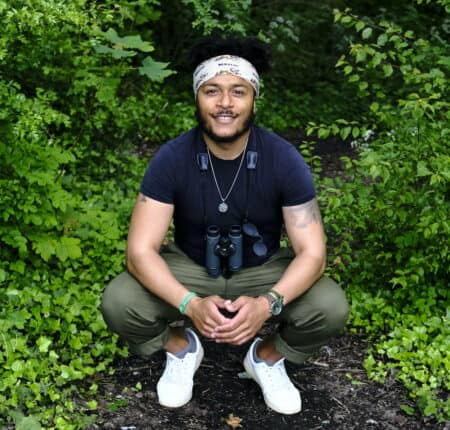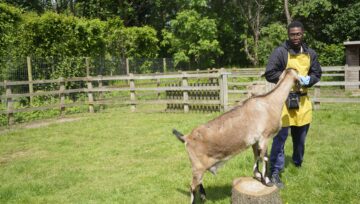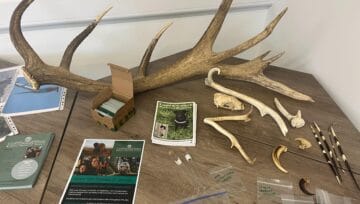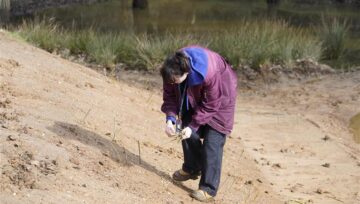How Tolga, a Former Student of Ours, Began his Career in Conservation
One of our former students, Tolga, is now a well-established conservation biologist, and environmental journalist.
Tolga took the time to answer our questions and share his experiences from some of his conservation trips with us, as well as tips for those looking to begin a career in conservation:
How did you find the conservation projects you volunteered for?
I often looked at online job resources such as Environment Job and Conservation Jobs for postings. I found that just searching the web for areas of conservation I am interested in presented some great opportunities as well (though it is important that you check the track record of how well organisations are contributing towards actual conservation work). There are many organisations out there, unfortunately, that are more focused on taking your money and providing volunteers with unnatural wildlife experiences. So, it is important to do your research and be careful. I also referred to ‘Bradt Wildlife & Conservation Volunteering: The Complete Guide 2nd Edition’ while I was in the early stages of my career. There are some great opportunities within the book which will give you an idea of what kind of opportunities are out there.
Applying for all of my volunteering and work opportunities has mainly been through sending emails and networking within the industry. So, naturally it is important that you gain communication skills to help you obtain these experiences. Do not be afraid to ask about positions even if what you are looking for is not advertised. You never know what opportunities may be waiting for you.
Can you tell us about your first conservation trip?
My first conservation trip occurred back in early 2015 while I was studying the Animal Care Diploma (Level 2) at Capel Manor College. I volunteered at a place called the UK Wolf Conservation Trust. Their focus was contributing towards global wolf conservation efforts and educating the public on the importance of protecting these misunderstood animals. This conservation project came about as I have always had a long interest and passion for the species from a very young age. Wolves are always shared through myths, stories, legends, the media, literature, and natural history television series – sometimes for better, or worse. I wanted to learn all about their conservation, biology, ecology, and behaviour which the Trust allowed me to achieve.
I was at the Trust for two weeks as a volunteer, and during my time there I helped clean out the wolves’ enclosures, assisted with feeding regimes, created enrichment for the animals, and quite frankly built the foundations for my future career without even knowing it. It was because of my experience here with the wolves, that I learned more about other species within the Canid family that wolves belong to. It was here where the genesis for my love of African wild dogs began, and my life has changed for the better ever since!
What did you learn from your first conservation trip?
I not only learned about the animals I was working with, but it also taught me to be resourceful, independent, confident, reliable, and provided me with a great work ethic that has stayed with me ever since. As a budding conservationist, during the infancy of my career journey, volunteering was an important process in establishing a career path. No matter where you ended up, you would find that most projects were heavily centred around people as much as it was with wildlife and nature. So, having those kind of acquired skills and having the ability to work well with people proved to be very valuable. The experience overall was so much more than I expected, and up until this day I still have to pinch myself about some of the experiences that I have had.
What has been your favourite conservation trip so far, and why?
That would easily have to be South Africa; it had always been my dream to go there and experience its wildlife and nature. That dream came true whilst I was studying for my undergraduate degree in Animal Biology at the University of Gloucestershire between 2017 – 2020. In 2018, I focused on crowdfunding and organised my own trip to South Africa where I volunteered with a conservation organisation called Wildlife ACT. I enrolled on one of their projects that focused on protecting endangered wildlife species such as the African wild dog, lion, cheetah, leopard, rhino, vulture, and elephant.
During my time volunteering I would wake up before sunrise to track species, fit lions, cheetahs, and wild dogs with radio collars, set up camera traps for nocturnal wildlife, traversed through the South African wilderness, and so much more.
This all by far has been my most memorable conservation experience to date. I enjoyed it so much that the following year I did it all again and travelled back over to South Africa to work with Wildlife ACT as a field researcher. I was able to collect data for my university bachelor’s project which focused on the prey preferences of African wild dogs and lions at one of the four reserves I visited and worked at within KwaZulu-Natal, Zululand. My research can be found here.
Why is conservation so important to you?
One of my conservation and photographer heroes, Adrian Steirn, wrote that both humanity and conservation are inextricably linked. What we do to the natural world and all its wild inhabitants – we ultimately do to ourselves too. Conserving the wild fauna and flora within our natural world is so important and vital for all life on Earth. Humans often forget that we, as a species, are a part of the web of life. We may sit on top of it as the dominant species, but collectively it is every species beneath us humans and all their interactions within the natural world that matter the most. That is worth conserving and protecting for future generations to come – because a world without our wild fauna and flora is not a world worth living in!
Have you faced any challenges working in conservation, and if so what were they, how did you overcome them?
I think the biggest challenge I have faced throughout my career journey so far has been the Coronavirus pandemic. It has impacted many of us in all kinds of ways indeed, but for individuals hoping to travel overseas for conservation work, the lack of travel opportunities has been a huge setback. I was fortunate enough to do the majority of my memorable conservation trips during 2018 and 2019. If I had wanted to do those same trips during 2020 and 2021 then things would have been very different.
Where do you plan on travelling to next?
I would love to visit South Africa again whilst also visiting different areas of the country to experience wildlife from differing habitats. Bringing things closer to home, something is drawing me up north to Scotland and even further into Europe to explore countries such as Romania, Bulgaria, and Turkey. I really want to explore deeper into the history of the biodiversity within these countries and examine how human life co-exists amongst our natural world’s wild places.
What tips do you have for someone planning their first conservation trip?
Take your time to research your desired conservation/project trip. Ask yourself what your motive is and will your work efforts have mutual benefits for both you and your conservation project partner. If your trip is abroad, then focus on how to stay safe for yourself and others overseas i.e., carbon offsetting, travel with eco-friendly sustainable products, supporting local communities whilst travelling etc. Try to think of ways to limit your impact towards the planet, and only travel by plane if there is no other way to travel to a certain destination. There are many national projects available too, which are equally important and rewarding in the conservation sector.
What advice do you have for students looking for conservation experience?
Keep your passion alive, and do not be afraid to try a variety of different experiences whilst you embark on the start of your career journey. You may find that getting to your desired work sector may take a while in the beginning, so finding projects or organisations to volunteer/work with will enable you to not only gain valuable experience, but if you are lucky enough you can establish good contacts for potential future employment. If you continue to work hard, always keep your short-term and long-term goals in mind throughout your journey, and network with as many people in the field as you can, then this should hopefully guide you in the right direction.
What tips do you have for those looking to start a career in conservation?
- Become knowledgeable about conservation and research as much as you can about what the sector is, who is working within this field, why it is important and ways to help contribute towards good causes. Whether it is staying informed with relevant and recent conservation news, educating yourself through the literature available online or through libraries, or even contributing your time and work efforts towards on-the-ground conservation projects.
- Be open to volunteering in various job types within the conservation sector to gain a thorough understanding of the different work efforts occurring in the sector.
- Learn how to be patient as the conservation sector is often slow, complicated, and frustrating, but the rewards through all of that are so worth it when they do come around. There is nothing better than playing our part for the greater good for our natural world.
- Stay passionate and always keep a better world in mind – it will take you far!
Find out more about Tolga, read his success story here.
Passionate about animals? Explore our courses in animal management, zoology, veterinary science and dog grooming.
We offer a range of nationally and internationally recognised animal management courses, ranging from further to higher education. Taught by industry-experienced professionals and designed to support progression to employment, our courses provide you with invaluable theoretical knowledge and practical experience.




